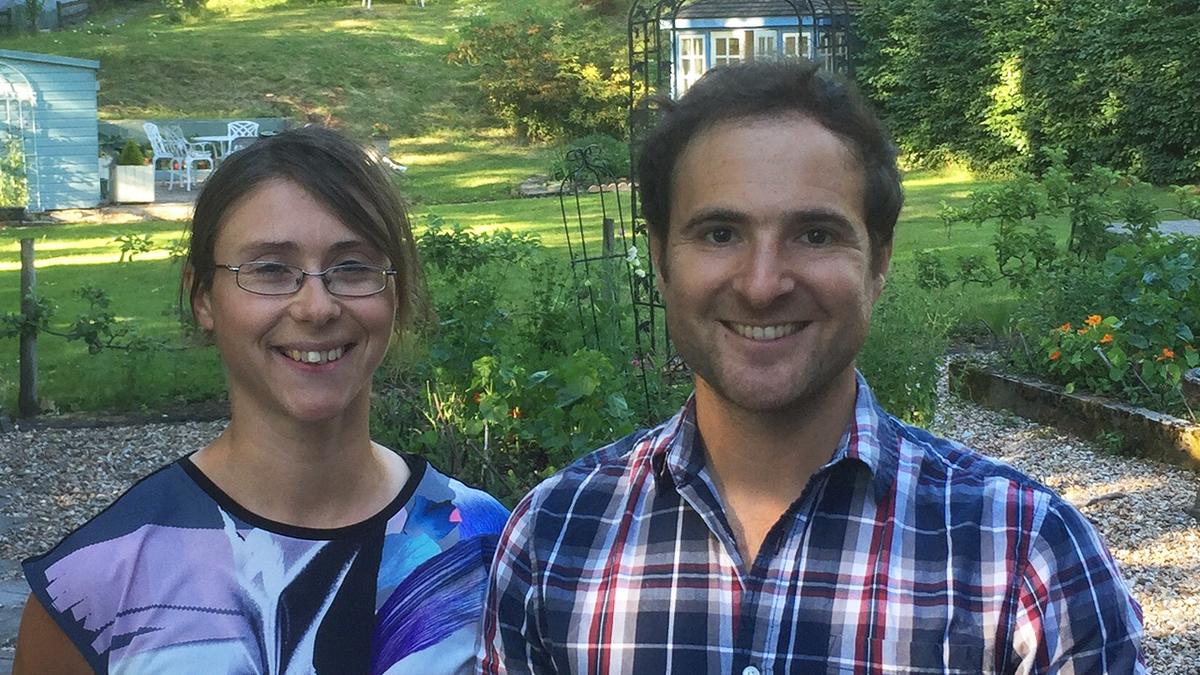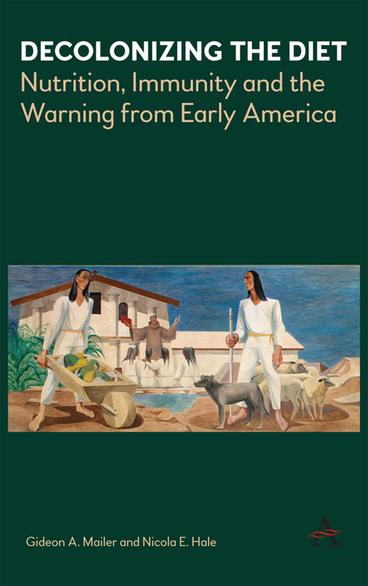Gideon Mailer, associate professor in the Department of History at UMD, and co-author Nicola Hale, who specializes in genetics, cell biology and biochemistry and has worked in assistant scientist positions at the University of Cambridge, U.K., have written a book entitled Decolonizing the Diet: Nutrition, Immunity, and the Warning from Early America. It was recently published by Anthem Press.
Decolonizing the Diet challenges the common claim that Native American communities were decimated after 1492 because they lived in “Virgin Soils” that made their working immunity distinct from those in the Old World.
“By connecting the latest work in the science of nutrition, immunity, and evolutionary genetics with cutting edge scholarship on the history of indigenous North America, Nicola and I highlight a fundamental model of human population destruction: Human populations have been able to recover from mass epidemics within a century, whatever their genetic heritage,” Mailer says.
“They fail to recover from epidemics when their ability to hunt, gather, and farm nutritionally dense plants and animals is diminished by war, colonization, and cultural destruction.”
Human Intervention and Demographic Decline
The book cautions against assuming that certain communities are more prone to metabolic syndromes and infectious diseases, whether from genetic differences or a comparative lack of exposure to specific pathogens.
“The book refocuses our understanding on the ways in which human interventions – particularly in food production, nutritional accessibility, and ecology – have exacerbated demographic decline in the face of disease; both in terms of reduced immunity prior to infection and reduced ability to fight pathogenic invasion,” Mailer states.
“Using nutritional science to understand the shocking history of post-contact Native American health and ecology provides a lens to comprehend the health crisis that has faced Europe, the United States of America, and the wider world since the 1960s. Many developed nations now face a medical crisis: so-called “diseases of civilization” have been linked to an evolutionary mismatch between our ancient paleolithic genetic heritage and our present social, nutritional, and ecological environments.
“The disastrous European intervention in Native American life after 1492 brought about a similar – though of course far more destructive - mismatch between evolved biological needs and declining nutrition in new societal contexts.”
A Course Becomes a Book
The book was inspired by a collaboration that began several years ago. “Nicola had been working in laboratories in the U.K., and I was a research fellow in history at the University of Cambridge. After I came to UMD, I realized that no existing book synthesizes the science of immunity and autoimmunity in light of historical case studies of nutritional change. And so Nicola agreed to collaborate on the project, providing expertise in biological science to complement my historical perspective.
“We drew together materials from history, anthropology, evolutionary biology, genetics, and nutritional biochemistry. The material contributed to a unique interdisciplinary course that I devised to teach at the University of Minnesota Duluth, on nutrition, evolutionary medicine, and early American and Native American history. We then wrote the book, after a long period of peer review.”
The Link Between Nutrition and Immunity
Through their research “We noticed ways in which the history of the global agricultural transition 10,000 years ago – and its problematic health dynamics – could inform the history of the Euro-American assault on Native American subsistence and nutrition after 1492.
“In researching and writing the book over the last few years, we also became increasingly aware of its place within broader public health debates– particularly those that relate to the current mismatch between our evolved nutritional needs and the problematic health consequences of excess carbohydrate consumption, a lack of Omega 3 Fatty Acids, and declining nutrient density.”
Mailer says their research reveals that nutritional diversity helps to keep people stronger in the face of infectious disease. “It’s a key take-way from the book and seems simple and even axiomatic. Yet as we found that scholars have only recently begun to consider the specific link between nutrition and immunity.
“We incorporate burgeoning scholarship on the importance of more nutrient-dense foods as viewed from an evolutionary perspective – including those relatively high in fat as well as other macronutrients and micronutrients. If those foods – and their relatively fixed proportion in relation to other nutrient sources - have been central to the development of human health and immunity over millennia, any deviation from their proportional dietary constituency may have deleterious consequences.
“Many of the problems that followed the move towards European agriculture in Native America now bedevil populations both inside and outside Native America. Pre-contact Native American civilizations incorporated ecological frameworks whose positive health outcomes can help us all overcome the problematic health and ecological effects of the global move towards the consumption of corn, soy, wheat, and factory-farmed animals, at the expense of more nutrient dense plants and animals since the 1960s.
“Sadly, American Indian communities have been more susceptible to certain problems that are more broadly associated with the modern western diet, as defined during the second half of the twentieth century – particularly its reliance on refined carbohydrates in packaged and processed goods."
The Flawed Food Pyramid
“In the final part of the book, we trace the problematic development of the modern Food Pyramid in Europe and America since the late-1950s, when scientists allied their scientific and nutritional research with new policies that came to be promoted by various governments and private industry leaders.
“At the University of Minnesota, Ancel Keys and other scientists famously sought a new research agenda to question the health benefits of fats from animals, fish, and dairy. Contrary to those who highlighted the problematic medical implications of foods that were readily converted into glucose, as well as the potential inflammatory effects of oxidized omega-6 polyunsaturated fats, Keys and others supported the governments of the day in their stated desire to increase agricultural output in soy, wheat, corn, and seed oils.
“A new generation of scholars, scientists, public policy analysts, and journalists, have recently begun to suggest that Ancel Keys was partly misinformed in his recommendations, and that the resulting Food-Pyramid worsened certain aspects of American public health, particularly through the associated growth of metabolic disorders such as diabetes, and even in the prevalence of certain forms of heart disease, though the exact effects of the 'Diet Heart hypothesis' on public health are still currently being debated.
“We believe it is important to avoid what might seem like an egregious comparison between the problematic health effects of the modern Food Pyramid and the horrific decimation of Native Americans due to the combination of newly introduced diseases with compromised immunity and fertility; a phenomenon that was exacerbated by nutritional degradation within a violent colonial context that prevented any adaptation to, or mitigation of, its problematic consequences.
“Nonetheless, there are salient associations to be made that are not egregious, and which can inform both contemporary Native American health strategies as well as other communities struggling with compromised metabolic health, nutritional status, and immunity.”
An Increase in Autoimmune Diseases
Mailer states that their research shows how the problem of immunity to infectious disease has increasingly given way to a public health crisis relating to the prevalence of autoimmune diseases.
“This is due to a mismatch between what humans are broadly evolved to eat and what many now consume. After European contact with Native Americans, the acute immune response to disease was compromised in part by nutritional scarcity.
“But today, as we can rely on antibiotics and vaccines to reduce the danger of infectious disease, autoimmunity has become a chief determinant of poor health and even mortality. The body’s internal immune response has become chronically over-active, due to inflammation following nutritional and metabolic derangement, leading it to attack its own tissues and hormonal pathways.
“Conditions such as diabetes are thus often associated with heart disease and other syndromes, given their autoimmune component. They now make up a huge proportion of treatment and spending in health services on both sides of the Atlantic.
“Yet we believe that policy makers and researchers in those same health services often respond to these conditions reactively rather than proactively - as if they were solely genetically determined, rather than arising due to external nutritional factors.
Mailer notes that, “A similarly problematic pattern of analysis has led scholars to ignore the central role of nutritional change in Native American population loss after European contact, focusing instead on purportedly immutable genetic differences.”
About Mailer
Gideon Mailer came to the University of Minnesota system from the University of Cambridge, U.K. His research focuses on the social, intellectual, constitutional, ecological, and religious history of North America and the wider Atlantic World from 1600-1865, as well as the impact of the American Founding in later history. In 2017, his book John Witherspoon’s American Revolution was published by the University of North Carolina Press, in association with the Omohundro Institute of Early American History and Culture in Williamsburg, Va.
Reviews for Decolonizing the Diet:
"Mailer and Hale provide a powerful critique of Virgin Soil theory and its claim that epidemics were the inevitable consequence of European colonization. Drawing on cutting-edge nutrition science, immunology, and archeology, they conclusively demonstrate how the chaos of encounter disrupted American Indian agriculture, triggered widespread malnutrition and left Indians susceptible to dire mortality."
—David S. Jones, A. Bernard Ackerman Professor of the Culture of Medicine, Faculty of Arts and Sciences and the Faculty of Medicine, Harvard University
"Mailer and Hale challenge us to consider how colonization’s multiple consequences—dietary changes, diseases, and settler invasions—resulted in long-term problems for Indigenous Peoples. Based on cutting-edge research on nutrition, immunity and ethnohistory, Decolonizing the Diet offers a fascinating analysis that both illuminates the past and informs the present." —Paul Kelton, Professor of History and Robert David Lion Gardiner Chair, Department of History, Stony Brook University
Top Photo: Nicola Hale and Gideon Mailer (submitted photo)
Visit the Department of History website

